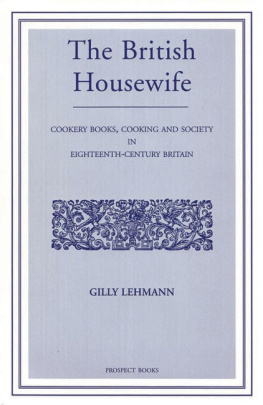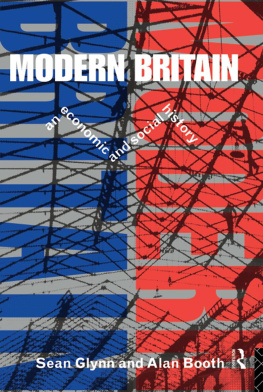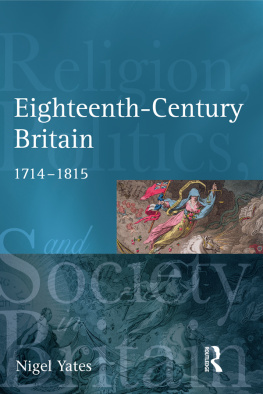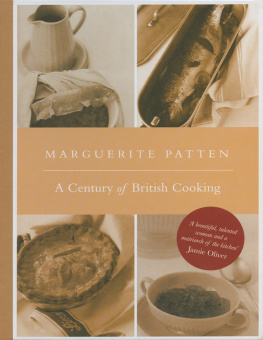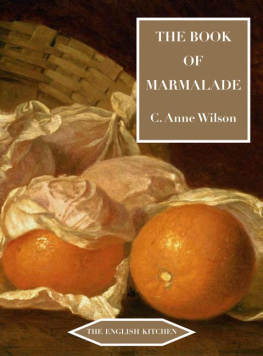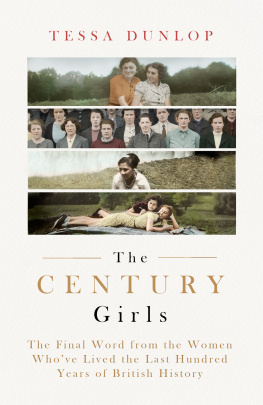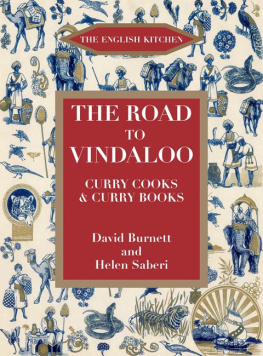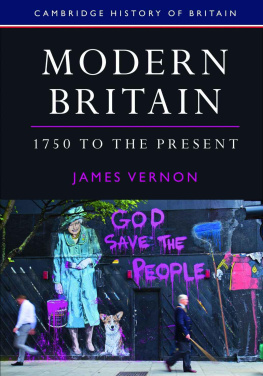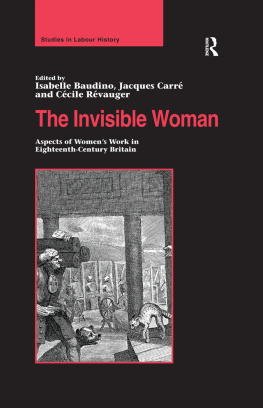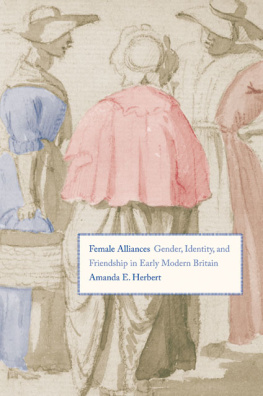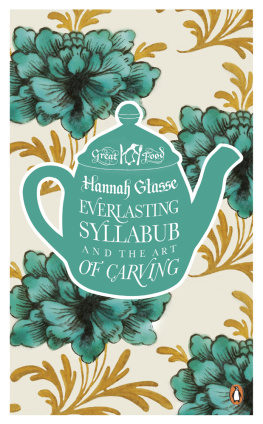Acknowledgements
I N THE COURSE OF THE MANY YEARS WHICH HAVE INTERVENED SINCE I first thought of turning idle curiosity into serious research, and then of turning a doctoral thesis in French into a book in English, I have accumulated debts to substantial numbers of people: other researchers, whether academic or not, librarians and archivists, friends and family who have offered moral (and sometimes gastronomic) support, and, of course, the army of previous authors on domestic history whose work provides a wealth of stimulating material and unexpected nuggets of information.
Most of my research has been done in the British Library, and I must thank the staff of the various reading-rooms for their help in dealing with my problems of document supply and occasional obscure questions. More recently, I have had the opportunity to test the Librarys online services, and have found all the electronic developments wonderfully efficient. Other libraries and archives where I have worked and whose staff have always been helpful are the Brotherton Library of the University of Leeds, the Public Record Office in London, the Kent Archives Office, Maidstone, and the Norfolk Record Office, Norwich. Many librarians supplied me with valuable bibliographical information in the early stages of my research, most notably the Fawcett Library in London, Glasgow University Library and, more recently, Newcastle City Library. My thanks go also to all the administrators of National Trust houses who have answered questions on books in their libraries and on the locations of manuscripts, and to the archivists of several other record offices and repositories who have answered requests for information with all the speed the impatient researcher has come to expect in the electronic age.
I am grateful to the British Library for permission to reproduce Patrick Lambs bill of fare illustrated on page 280. I am also grateful to Liz Seeber for the image of Patrick Lambs title-page illustrated on page 60, and to the Keeper of Special Collections at the Brotherton Library of the University of Leeds for supplying the images of frontispieces illustrated on pages 2, 128 and 292.
In the French academic world, my greatest debts are to Michel Baridon, who agreed to take on someone whose research area was unusual to the point of eccentricity and who, as my thesis supervisor, encouraged the work with unfailing enthusiasm; and to Jacques Carr, who gave me the first push towards academic research and who has been a constant source of support and stimulating criticism ever since. Although my own commitments did not allow me to attend them very often, the late Jean-Louis Flandrins seminars at the Ecole des Hautes Etudes in Paris always provided fresh impetus and his comments set me right on the use of statistics in the analysis of receipts. Also in Paris, Philip and Mary Hyman have always been generous donors of facts and food, the former generally in response to a panic-stricken, last-minute appeal. My own University of Franche-Comt in Besanon contributed materially to this book by giving me two periods of sabbatical leave to pursue research in England, in 1986 and again in 1998, without which my work would have been poorer and even later. Another material contribution came from the American Institute of Wine and Food in Paris, which gave me a grant towards my research on connections between English and French food in 1996.
On the other side of the Channel, Alan Davidson helped in many ways, giving me access to his collection of cookery books, and providing suggestions, encouragement, and even alcoholic refreshment at strategic moments. Tom Jaine has been a stalwart prop and support to the business of turning research into print, ever since he asked me to write the introduction to the reprint of Martha Bradleys weighty tomes. The participants in the Oxford Symposium on Food and Cookery (not to mention the organizers) always widen ones horizons: I thank them all. I must also record the great generosity of Chris Lewin, who has shared with me so much information on manuscript cookery books and who has responded to all my requests for further information concerning problems of dating. Others who have passed on information include Anne Wilson, Ivan Day, Fiona Lucraft, Elizabeth Gabbay, and Robin Weir and, from places further afield, Beatrice Fink and Rachel Laudan.
Some of the comments on the influence of politics on eighteenth-century perceptions of food have already appeared in my article, Politics in the Kitchen ( Eighteenth-Century Life 23 (2), May 1999), and I am grateful to the Johns Hopkins University Press for permission to re-publish copyright material here.
Finally, a heartfelt thank-you to the sufferers from this enterprise: to my sister in London, for giving me a base for my work and producing restoring food and drink at the ungodly hours I adopt when the passion for research keeps me at my desk in the library until closing-time; and of course to my husband and computer-guru who saves me from disaster and accepts ungastronomic meals and improbable meal-times with equanimity.
GILLY LEHMANN
Bonnevaux-le-Prieur, 2003
SELECT BIBLIOGRAPHY
This bibliography contains details of all the primary and secondary sources used for the study. There is, however, such a wealth of information to be found in every issue of Petits Propos Culinaires (here referred to as PPC )and in the various volumes of the Proceedings of the Oxford Symposium on Food and Cookery that to mention every article containing useful information would have resulted in a totally unwieldy list. Thus only articles from these sources which are specifically cited in the text are included here. I have, however, included books which, although not cited, offer the useful background information which lies behind the ideas in this book.
For the full text of the title-pages of the eighteenth-century cookery books, with a brief description of the contents, and comments on dates, sources and bibliographical puzzles where appropriate, the reader is referred to Appendix III.
MANUSCRIPTS
PUBLIC RECORD OFFICE
C 107/108, Margaretta Acworths cookery receipts.
LC 5/42, 53, 68, Lord Chamberlains warrants referrring to Patrick Lamb.
LC 5/180, 196, Ordinances of the household of Charles I, Charles II, James II.
LS 9/5055, Extraordinary diets, 16801714.
LS 9/78226, Royal bills of fare, 16601812.
LS 13/10, Cheque Roll of warrants, James II, William III, Anne.
LS 13/3941, 44, Establishment books, 1689, 1699, 1701, 1714.
LS 13/115, Minutes of the meetings of the Board of Green Cloth, 171426.
LS 13/251267, Warrant books, 16261821.
T 48/10, Establishment books, 16641709.
KENT RECORD OFFICE, MAIDSTONE
U49 F15, Mary Watts cookery receipts, mid-17th century, and later additions.
U269 F38/2, Lady Rachel Fanes receipt book, mostly medicinal, mid-17th century.
NORFOLK RECORD OFFICE, NORWICH
HMN 4/5, Hamond family receipt book, c. 173979, cookery at one end, remedies at the other.
MC 443/1, Jane Freres receipt book, 17421813, mostly medicinal.
WKC 6/12, Katherine Windhams memorandum book, 16691689.
WKC 6/457, Katherine Windhams receipt book, cookery and preserving, dated 1707 but with receipts into 1720s.
BRITISH LIBRARY, MANUSCRIPTS DEPARTMENT
Additional MS 29739, Elizabeth Sloanes fair copy of Mary Ealess receipt book, dated 1711 (perhaps an error for 1721?).
Additional MS 30244, Anne Nicholsons receipt book, culinary and medicinal, dated 1707 but with later additions in other hands.
Additional MS 3269433331 (Newcastle papers)
32694, contains a letter from Verral to Newcastle about a vacancy in the PostOffice, 1740.
32704, contains a petition to Sir Francis Poole signed by Verral, 1745.
32734, contains correspondence between Clouet and Newcastle, 1754.

